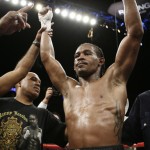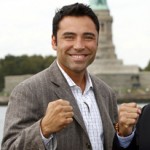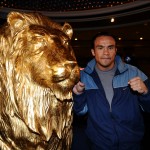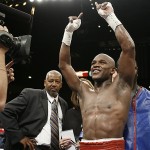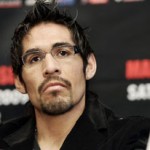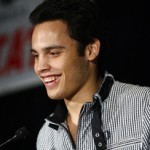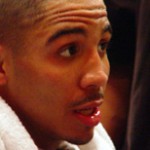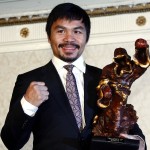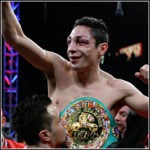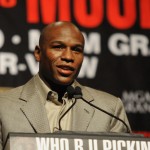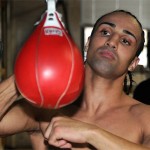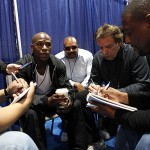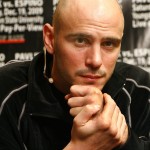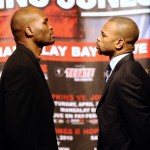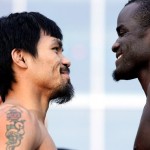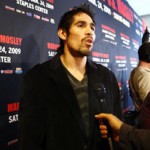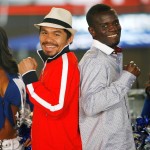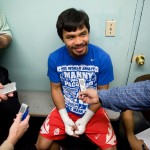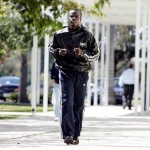LAS VEGAS – Who R U Picking?
Dumb question.
Turns out, Shane Mosley picked the wrong guy. He picked Floyd Mayweather Jr. as an opponent. But it’s hard to beat a legend, which is what Mayweather became Saturday night at the MGM Grand with a unanimous decision that backed up years of bragging about how he deserves a share of the fame that belongs to the greats who fought before him.
Mayweather, 41-0, 25 KOs) survived a dangerous second round and went on to dismantle Mosley (46-6, 39 KOs) in a fashion that was thorough as it was surprising. Mayweather didn’t knock out anybody but his critics. But his one-sided victory said it all, over and over again. Other than perhaps Manny Pacquiao, there is nobody better than Mayweather.
“If he wants to fight,’’ he knows where to find me,’’ Mayweather said of a showdown that didn’t happen in March because Pacquiao would not agree to Olympics-style drug testing.
Mayweather said again that he would fight Pacquiao only if he agrees to random drug testing. It looks as if a resumption of resumption of the controversial talks with Pacquiao will be Mayweather’s next fight. For now, there is only his latest addition to his claim that he has to be considered the best in today’s pound-for-pound world. It’s safe to say he will gte no argument from Mosley, who lost by 119-109, 119-109 and 118-100 on the scorecards.
“I did what the fans came here to see, a toe-to-toe’’ Mayweather said. “That’s not my style. But I wanted to do it.’’
In expectation of Mayweather’s promise, the building buzzed for about 30 minutes before Mosley and Mayweather left their dressing rooms and made that ritual walk, down the aisle, up the steps and through the ropes. Muhammad Ali was there. Sugar Ray Leonard was there. Mike Tyson was there. Thomas Hearns was there. Anticipation was everywhere.
Mosley was the first to enter. His robe was trimmed in a light blue that matched the turquoise shade of his eyes. On the back, there was the image of warrior mask sewn into the silk.
Then, there was Mayweather, choreographed like a concert and overdone like a circus. First, there were the OJs, singing an old-school version of rhythm-and-blues with the emphasis on Money, Mayweather’s nickname. Then, there were clowns and dancing girl on stilts tossing bills of what had to be – what else? Money. Finally, there was Mayweather, who didn’t look as if he was embarrassed by any of it.
Mayweather’s showmanship was predictable. His first round wasn’t.. At the opening bell, he began moving forward, instead of waiting for for Mosley to come to him. If it wasn’t out of character, it was dangerous.
In the second round, Mayweather found out just how dangerous. Mosley landed a head-rocking right. It hurt, hurt enough for Mayweather to hold on for several seconds. Then, there was a left-right combination from Mosley. The combo’s power buckled Mayweather’s knees.
For the first time in Mayweather’s pro career he staggered and stumbled, almost as if he were about to embark on his first fall to the canvas. He didn’t. He stayed upright even on uncertain feet that moved across a padded surface that must have felt as if it were shaking from a quake in some unseen fault line.
That triumph over momentary adversity set the stage for the victory that backs up so much Mayweather’s claim on being a legend. He overcame what many though he could not. He was still stading. Everything else, or at least the next 10 rounds, would belong to him.
From round to round after the dramatic second, Mayweather employed a right hand that grew progressively more accurate against Mosley, whose jab appeared to become as progressively erratic. Stinging rights, one after another, seemed to fuse Mosley. If he had foreseen a plan, he didn’t see anything but that right whistling at him from the fifth until the twelfth.
In the end, there were no surprises. Mosley looked like an old man and Mayweather, still unmarked, looked like the legend he said he has always been.
Golden Boy Promotions CEO Richard Schaefer calls Saul Alvarez the Mexican James Dean. Schaefer is looking for stardom. He’s still looking.
Alvarez, a much-hyped welterweight from Guadalajara, won, scoring a ninth-round TKO of Puerto Rican Jose Miguel Cotto in the last fight before Floyd Mayweather Jr. and Shane Mosley stepped into the ring at the MGM Grand Garden Arena. But Alvarez’ performance in his Las Vegas debut was uneven, at best.
Alvarez (32-0-1, 24 KOs) went from almost getting knocked out in the first round, to nearly scoring a second-round KO, yet not finishing job until the final second of the ninth.
If not for the ropes, Alvarez would have been knocked down by a powerful left in the first from Cotto (31-2-1, 23 KOs), Miguel’s brother. Alvarez stayed on his feet and regained his wits in time to deliver a three-punch combo in the second that had Cotto stumbling across the canvas. It was scored as a knockdown. But Alvarez could not turn it into a knockout, at least not until late in the ninth when Tony Weeks stopped the fight after a succession of right hands from Alvarez.
Mexican featherweight Daniel Ponce De Leon retained the World Boxing Council’s Latino title by surviving a late rush from Cornelius Lock of Detroit for a unanimous decision in a close bout on the Floyd Mayweather Jr.- Shane Mosley undercard.
De Leon (39-2, 32 KOS) built up a lead on the scorecards with consistent aggressiveness and straight shots up the middle. Lock (19-5-1, 12 KOs) appeared to tire in the middle rounds, although he rocked De Leon with a couple of right hands in the ninth and 10th. By then, however, it was too little, too late. Scores were 97-93, 96-94 and 96-94.
Within a couple of minutes, Las Vegas welterweight Said Ouali was down once and threw five punches. If you think that adds up to defeat, you’d be surprised. You’d also be wrong. Ouali (27-3, 19 KOS) won, getting up from the knockdown and making the most out of those five punches for a first-round stoppage of Argentina’s Hector Salvida (31-2, 24 KOS).
“He surprised me when he hit me with that first punch,’’ said Ouali, who would go on to deliver a much bigger surprise after he was floored by a sudden right hand.
Ouali quickly scored two knockdowns, first with a left hand and then with a combination. Salvida got up from the second knockdown, but then staggered into his corner where he began collapse. That’s when referee Russell Mora stepped in, stopping it at 1:47 of the first.
In the final off-tv bout, it was a battle of pro debuter’s from Las Vegas that saw Daniel Reece, 136 lbs score a unanimous decision over Angel Soto, 137 lbs. Scores were 39-37 on all cards—Marc Abrams
There’s no secret to staying unbeaten. Sometimes, there’s just a combination. Las Vegas welterweight Jessie Vargas (10-0, 5 KOs) put the right combo together in an untelevised bout before the Floyd Mayweather Jr.- Shane Mosley showdown.
Vargas threw a left hook and followed with a straight right, backing Arturo Morua (25-14-1, 14 KOs) Mexican into the ropes and leaving him dazed long enough for referee Tony Weeks to declare Vargas a winner by TKO at 1:20 of the sixth round.
North American Boxing Organization junior-lightweight champion Eloy Perez (7-0-2, 4 KOs) of Salinas, Calif., retained his title with stubborn pursuit and punishing left hands for a majority decision over lanky Gilberto Leon (25-14-1, 14 KOs) of Mexico.
In the card’s second bout, super-middleweight Dion Savage (8-0, 5 KOs) of Flint, Mich., scored a unanimous decision over Tommie Speller (5-4, 3 KOs), a Philadelphia fighter who left the ring with his white trucks and dark beard covered in blood. A Savage right hand early in the second round opened up a nasty cut above a left eye that troubled Spiller until the decision was announced after the eighth.
The card began with angry complaints echoing through the an empty building. Junior-welterweight Allen Litzau (13-5, 7 KOs) of St. Paul, Minn., wasn’t happy at second-round TKO loss to Luis Ramos Jr. (15-0, 8 KOs) of Santa Calif. Ramos knocked down Litzau early in the second with a left hand. Seconds later, Litzau, with trainer Roger Mayweather in his corner, got rocked again.
Referee Russell Mora had seen enough. He stopped it at 59 second of the rounds. Litzau howled in protest. He even hit the canvas again, this time rolling around like a kid angry at his parents. Lucky for him, nobody, other than Mora and a few ushers, saw the temper tantrum
